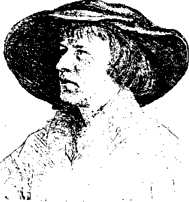Alchemy and chemistry
Phillipus Aureolus Theophrastus Bombastus von Hohenheim: Paracelsus was an energetic, irascible, iconoclastic thinker.
He experimented with alchemy* -- which for all its search for the unfindable, was a branch of knowledge that encouraged experimentation rather than the simple acceptance and reiteration of earlier writers.
His reputation for miraculous cures led some to say he was Faustus reincarnated; but from this distance we can see that his most important contribution to knowledge was his rejection of the concept of the four elements, and his introduction of what we now call chemistry into medicine.
New elements
Paracelsus maintained that there were three, not four basic elements--mercury, salt, and sulphur. As in the system he attacked, disease was still thought to be the result of an imbalance of elements; the difference was that the imbalance could be treated chemically--sulphur or salt could be added in a way impossible for earth or fire).
The result was that there were new drugs in addition to the ancient largely herbal applications of traditional physicians. Some (lead, mercury, arsenic) were no doubt lethal, in the long term if not immediately, but they also made possible cures that were impossible before, especially of the newly virulent venereal diseases which were probably introduced from the New World.
Paracelsus was a controversial* figure; but he and his followers experimented, and they read in the book of nature.
The alchemy web site and virtual library.
Footnotes
-
Alchemy
Alchemy deserves a site on its own, so complex are its symbols and its long history. The alchemists were not cranks, seeking easy riches in trying to turn base metals to gold; though there were no doubt many charlatans of the kind Ben Jonson satirizes in The Alchemist, they were on the whole devout men, trying to elucidate the mysteries of written texts and of nature.
The process of seeking gold was seen as analogous to the process of seeking salvation; in each case the base, earthly material was to be purged, allowing the pure metal--or soul--to shine through. Alchemical techniques, especially distillation, spread beyond the initiates to ordinary people; click for more on distillation.
-
The death of Paracelsus
His mysterious death is a figure for the controversy he stirred: his detractors claimed he died in a drunken debauch, while his supporters believed he was murdered by jealous rivals.
